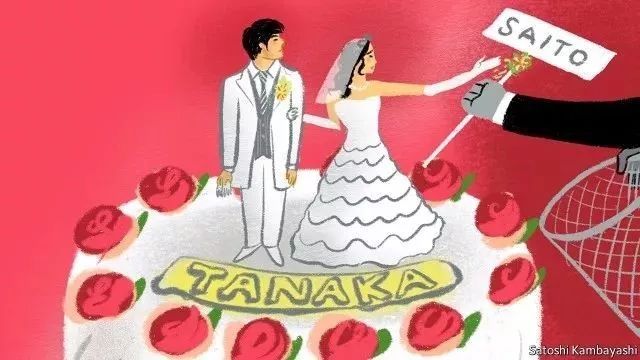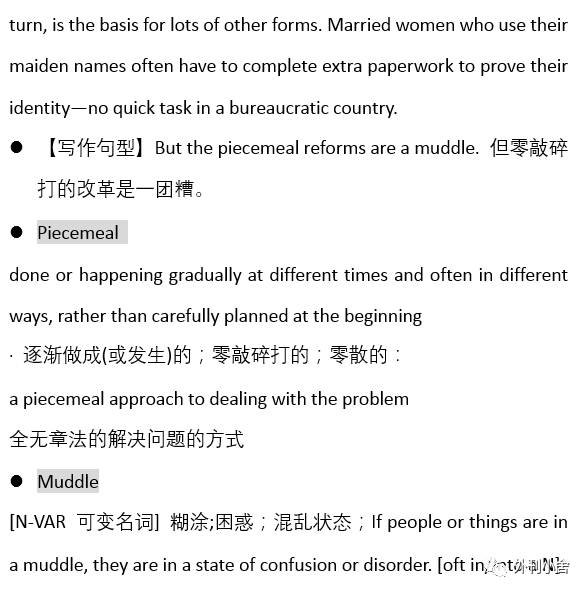12
月
3
日
周
日
文章来源:
本篇经济学人选自于ECO中文网。
外刊链接:
欢迎关注本公众号“外刊小舍”,后台回复“经济学人”,可得外刊链接;回复“资源”,可得2016~2017年外刊“纽约客”获取方式。
词伙来源:
所有的生词、短语搭配、例句来源于牛津高阶学习词典英汉双解第七版、韦氏词典、macmillan Dictionary 、朗文双解等。
外刊原文
Surnames inJapan : When two become one
The rule that married couples mustshare a surname is causing confusion.
AYOUNG professional wants to marry the father of her two children. But if shedoes, one of them would have to take the other’s surname. Japanese law requiresmarried couples to share a family name. That would lead to confusion: they havealmost the same first name and work for the same organisation.
Theirsis a rare case. But there are plenty of practical reasons, let alone ones ofprinciple, why people might not want to change their names. Married femaleemployees are often allowed to use their maiden names at work. But thebureaucracy, which has long enforced the law for official documents (for thenames both of employees issuing them and of ordinary citizens mentioned inthem), is only just beginning to be more flexible.
Femalejudges have recently been allowed to sign rulings using either their maidenname or their married one. For certain tasks, the patent office is givingworkers a choice too. From next year the government will allow people to usetheir preferred name when dealing with the local council, and perhaps also ontheir passports from 2019.
Amajority of the public reckon married people should be free to choose theirsurnames, according to polls. The traditional family is still very much thenorm in Japan: hardly any children are born out of wedlock, for example, andgay marriage is illegal. But there is a growing sense that some of theconventions surrounding family life are unduly rigid.
Therequirement that a married couple share a surname, which dates back a littleover a century, is seen by many as entrenching sexism. The law does not specifythat it is the wife who must change her name, rather than the husband, but 96%of the time that is what happens. It is no coincidence that the three femalejustices all dissented against a ruling of the supreme court in 2015 that foundthat the law did not violate the constitutional right to equality.
Butthe piecemeal reforms are a muddle. A lawyer can submit documents to a courtusing her maiden name, but can only register property for clients using hermarried name, for example. Even if a woman uses her maiden name at work and onvarious documents, she must still alter it in the koseki, the official registerof the population. The koseki, in turn, is the basis for lots of other forms.Married women who use their maiden names often have to complete extra paperworkto prove their identity—no quick task in a bureaucratic country.
“Itwould be simpler to allow couples to have different surnames on the familyregister, but this is the conservatives’ last line of defence,” says YuichiKaido, a (male) lawyer whose long-term partner is Mizuho Fukushima, a prominentlawmaker and campaigner for reform. Conservatives, many of whom belong to theruling Liberal Democratic Party (LDP), see change as imperilling the family,and a woman’s traditional place in the home.
Somewould like to abolish the koseki, which lists people by family unit rather thanas individuals. Campaigners point out that each family must name a head ofhousehold, who is almost always a man. Women who marry are transferred to theirhusband’s entry, as if they were property.
“Ithink it has a strong effect on the mindset of the people,” says Tomoshi Sakka,a lawyer in Okayama, a city in the south of Japan. Next year he will representa couple challenging the surname law. “It creates the idea that a wife is to followher husband after marriage.”
Japanis falling behind its neighbours, too. South Korea abolished its familyregister in 2005 after its supreme court found it discriminatory. China stillmaintains one, but married women there have never taken their husband’ssurname.
MrSakka is confident that the law’s days are numbered. But that may not changethe convention: even in countries where women don’t have to change their nameon marriage, most do. Take Britain, where a survey last year found that 59% ofyoung women want to take their husband’s name (and roughly the same proportionof men want them to do so). That share has not changed in a generation.
2017/12/3 精读笔记
Sunday
想要获得本篇word版笔记请转发本期推文至100人以上群或朋友圈1小时,截图发至后台即可获得。
英语 | 外刊 | 干货
更多外刊精读请关注微信公众号
外刊小舍
























